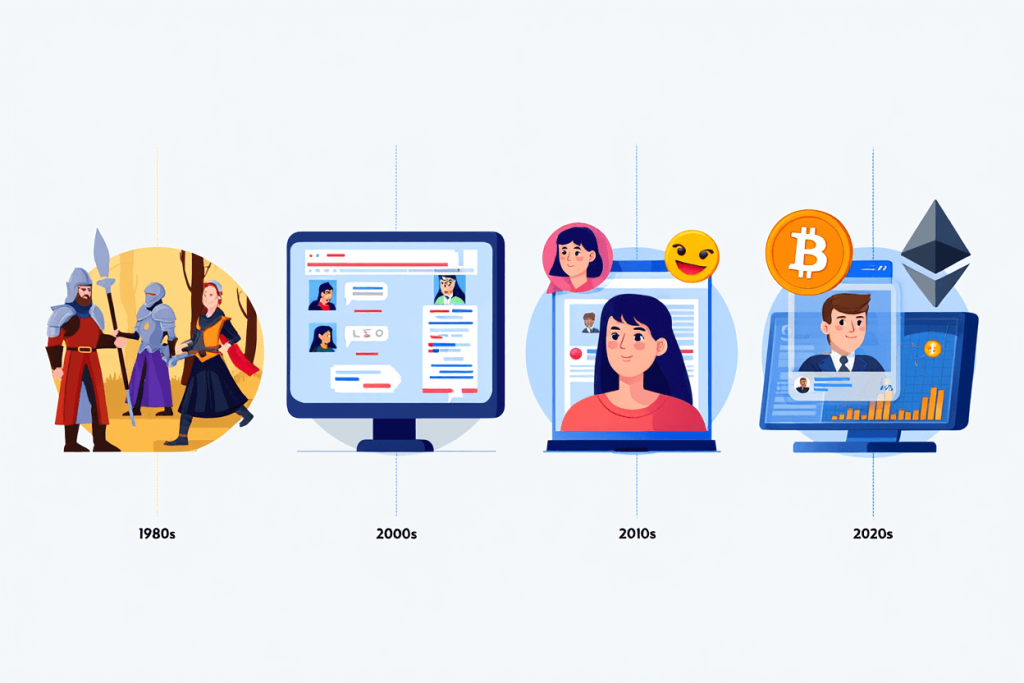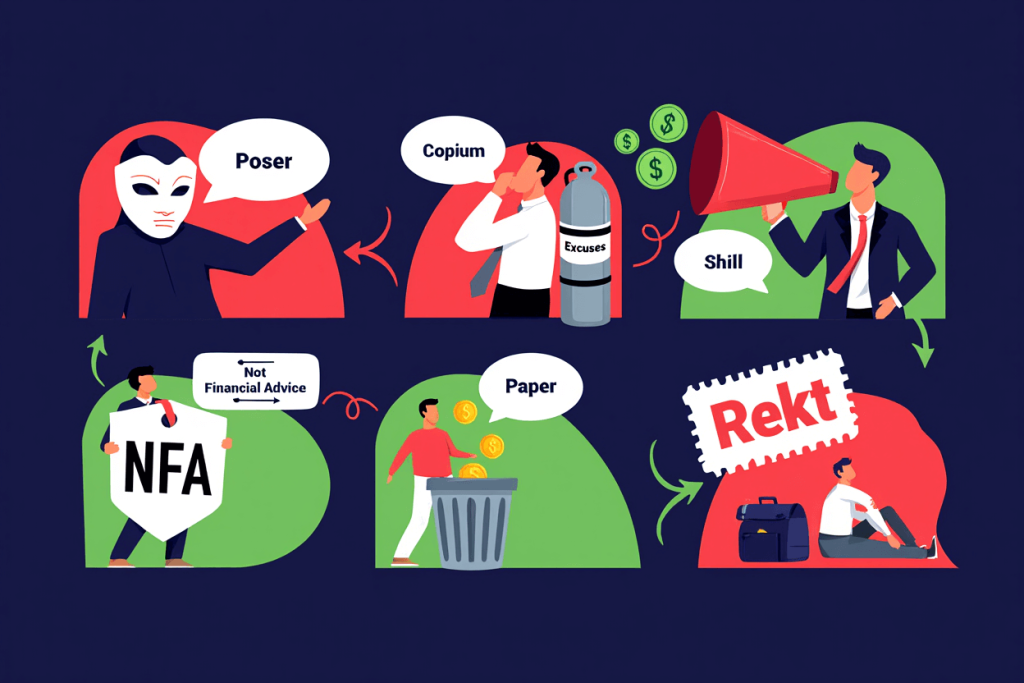Physical Address
304 North Cardinal St.
Dorchester Center, MA 02124
Physical Address
304 North Cardinal St.
Dorchester Center, MA 02124

The term LARP crypto meaning has gained popularity, evolving from its origins in gaming to represent people who pretend to have expertise or involvement they don’t truly possess. In the cryptocurrency world, LARP stands for Live Action Role-Play, but it has taken on a unique crypto meaning: it’s slang for pretending to be someone or something you’re not. In crypto spaces, calling someone a LARP means accusing them of faking expertise, influence, or involvement, often to mislead others or hype a project.
This term, borrowed from gaming culture, highlights how digital personas can blur reality, especially in fast-moving online finance. You’ll often see it used on X (formerly Twitter) or Discord forums, for example: This guy is just LARPing as a crypto whale, no proof, just big talk. In this guide, we’ll break down LARP’s definition, origins, signs, and effects in crypto for 2025, helping you spot trends and avoid digital deception.
Traditionally, LARP refers to Live Action Role-Playing, a hobby where participants physically act out the roles of characters in imaginary settings, such as fantasy battles or historical reenactments. This activity became popular in the 1980s and 1990s among gamers and fantasy fans. Over time, the word LARP made its way through various internet subcultures and online forums, shifting from literal costumes and foam swords to metaphorical role-playing, the act of pretending or playing a character online. Here’s a quick timeline:

This evolution marks a shift, from in-person acting to digital personas, setting the stage for crypto’s own version of LARPing.
To explore similar concepts, check our crypto knowledge section for beginner-friendly explanations.
Within crypto, LARP has evolved from its gaming roots to represent anyone pretending to have authority, insight, or association they don’t truly possess. If someone claims, I just got insider alpha from a dev friend, ETH is about to double, and offers no verifiable proof, community members might call that person a LARP or accuse them of LARPing.
| Original LARP | Crypto LARP |
|---|---|
| Literal: Dress as warrior, join fantasy quest | Metaphorical: Pretend to be early investor, expert, or project insider |
The word functions in multiple ways:
The meaning ranges from negative (fraud, manipulation) to neutral (internet fun or jokes), and rarely positive (community-building play). For example, in a Reddit thread: Most of these airdrop guides are just LARPs, test before investing. The flexibility of the term reflects crypto’s blend of tech, finance, and online culture.
Several factors make crypto ecosystems especially prone to LARPing. First, anonymity is the norm, people can create multiple identities with little effort. The technical barriers of blockchain and DeFi (decentralized finance) mean it’s easy to impress less experienced users with jargon or claims. Price volatility drives FOMO (fear of missing out), so the temptation to trust bold voices increases during hype cycles.
In short, crypto offers fertile ground for LARPing, mixing legitimate innovation with viral distraction.
See more related articles:
Each type has signs, no proof, sudden fame, repeated buzzwords, or unverifiable stories. Community responses range from meme-calling to outright bans or reports on platforms like X and Discord.
Below are how you can spot a LARP in Crypto:

| Red Flag | What It Means | Example |
|---|---|---|
| No verifiable identity | Anonymous account, sketchy social profiles | 0 followers, stock avatar, recent join date |
| Unproven expertise claims | Claims of being an expert without evidence | 10 years trading ETH but no linked account |
| No blockchain proof | No on-chain wallet or GitHub history | Built this protocol myself, with no code linked |
| One-sided, too good to be true advice | Shills a coin/NFT without mentioning risks | This token will 100x, no doubts! |
| Overuse of buzzwords | Floods posts with jargon to create an aura of expertise | Next-gen zk-L2 with AI yield optimization! |
| Inconsistent story across platforms | Claims change or contradict on different forums | Says OG holder on Reddit, dev on X |
| No historical activity | Account only posts in trending threads or pumps | Joined May 2024, all posts shilling |
| Ghost followers or engagement | Fake social proof, bought likes | Thousands of likes, zero real replies |
| Ignoring calls for proof | Deflects when asked for wallet or credentials | Privacy concerns, can’t show proof |
| Promoting risky insider tips | Claims special access, urges immediate action | Only 24hr left, insiders buying! |
To counter LARPs, apply E-E-A-T: vet sources for experience, expertise, authority, and trust. Always ask for verifiable links, check multiple sources, and remember, if it sounds unbelievable, it probably is. Community due diligence helps reduce LARP impact as crypto grows more mainstream in 2025.
LARPing in crypto brings both challenges and occasional odd benefits. On the negative side:
There are rare positives: some meme LARPing fosters in-jokes and camaraderie, acting as social icebreakers in online communities. Social experimentation can also expose flaws in how projects vet contributions or manage info.
Real-world example: In 2024, one high-profile scam used influencer LARPing to collect $2 million in fake NFTs before vanishing. Regulatory bodies are stepping up scrutiny, with projects increasingly verifying developer credentials and requiring wallet proofs. Still, users must stay vigilant, especially as mainstream adoption increases and LARP sophistication grows.
Below are Tems and Slang overlap with LARP in crypto:

These terms often mix in conversations. For example, a user might say, Ignore that shill, just another LARP coping with his rekt trades, showing how language layers combine to build context and warning signals within the crypto sphere. See Investopedia and CoinMarketCap glossaries for more definitions.
Sometimes, harmless meme LARPing can foster community laughs or social bonding. But even just for fun LARPing risks confusing new users or enabling bad actors to blend in, so always stay alert.
Ask for verifiable proof, on-chain evidence, GitHub links, or clear credentials. If unsatisfied, report or block suspicious users. On platforms like Discord and X, moderation teams take action on clear evidence.
New NFT launches, meme coins, and low-cap DeFi projects face the most LARP-related hype, but even large blockchains like Ethereum or Solana see this behavior around major news or upgrades.
Yes, due to financial stakes and technical complexity, crypto LARPing can cause direct losses or bigger misinformation waves than most casual internet communities.
How can I report/block LARPs? Use in-platform reporting tools (X, Discord, Telegram). For scams, also alert community moderators and consult guidelines on trusted forums like r/cryptocurrency.
See more related articles:
As crypto grows more mainstream in 2025, understanding terms like LARP is more important than ever for both new and seasoned investors. LARPing, digital role-play that ranges from playful meme culture to outright fraud, reflects the unique blend of trust, anonymity, and hype that defines the cryptosphere. By learning the signs, terminology, and context, you can better protect your assets and help foster a transparent, trustworthy crypto community.
Web Tai Chinh is a portal that updates news and information related to finance quickly and accurately, helping users have an overview before investing, clearly understanding concepts and terms related to Finance.
📞 Contact: 055 937 9204
✉️ Email: webtaichinh@gmail.com
📍 Address: 13 Ho Tung Mau, An Binh, Di An, Binh Duong